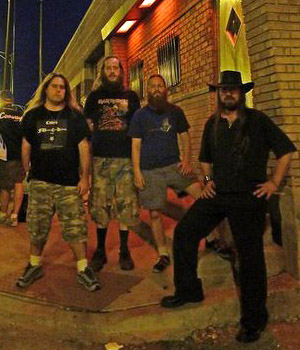
PAO Productions: Thanks for agreeing to this interview.
Teiwaz: Thanks for having us.
PAO: What's the origin of the name Kin of Ettins?
Jötun: It's an English translation of an ancient Icelandic poem called the Völuspá, and it, in colloquial terms, means "blood of giants." It was selected for a name for the band because it was a mythological reference to creation and creativity and also because it was something that seemed to carry a lot of weight, which we wanted for the style of music that we play.
PAO: Tell me about the formation of the band.
Jötun: I kinda started conceptualizing it right around 2004, a little while after my previous band had collapsed, and I started writing songs for it. Once I had a collection of material that could be worked into something, I contacted Donar, our bass player, who I'd known and played with previously. We got some tracks laid down, some demo tracks, just he and I and a drum machine, and got it out there and actually got kind of a positive response, and actually released it as a hard copy at the same time that we played our first show, which was roughly seven years ago this month. And then it just kind of took it from there. The feedback that we got off of what we were doing was positive enough that we just kind of snowballed it and carried on.
PAO: How did you find the other members for the project?
Jötun: Well, I'd known Donar for over twenty years. He and I played in a band previously and had always kept in touch. I knew Teiwaz from a previous job, and we have some mutual friends so we'd kind of seen each other here and there over the years. When our previous lead guitarist left, we started . . . at least, we announced auditions. We got him in for his first, second, and third auditions, and that was pretty much it, we didn't try anybody else out. He worked out. And we'd had KC, our drummer, because he was an acquaintance of Donar's, and had just kind of started picking up playing drums, but he worked out well when we hooked up with him. His style has grown as he's played with us. That's kind of how we came together. We've got a strong, reliable lineup.
Teiwaz: Yeah that was where I came in. I joined in April of 2011, after Jötun contacted me one day. He said they were looking for a new lead guitarist, asked if I'd be interested and . . . "Hell yeah, I'm interested. Send me some info." He sent me a link of some music they had recorded, and I listened to it and like . . . "Hell yeah, I'd like to work with you guys." I came out and I tried out two or three times, and officially joined in April of 2011. I think I'd spent about a month or so working on learning all the songs before we actually jammed. That was how at least I came into the band, and how the current lineup came together.
PAO: Your sound's been characterized as being more old school and traditional. What are some of the major influences that have helped mold the sound of Kin of Ettins?
Jötun: I come from very much the Black Sabbath school of thought. There's really a lot going on with Black Sabbath. The foundation for heavy music that they set down, I think . . . for what I want to do with songwriting, at any rate, for the vision I have as far as what I want to create, the blueprint that they came up with, it gives you a lot to work with in a songwriting sense, in a sound writing sense. You can base just about anything on top of that, and you can work other influences that are not necessarily heavy music into that, into that frame a little bit. It leaks in on its own very naturally. So definitely Black Sabbath. But as far as metal goes, I would say that there's such a broad spectrum of what goes into what we're about. Of course, I grew up on Judas Priest as well, old school Metallica, Testament, Slayer, Iron Maiden. And I think what really set me on the path of knowing that I wanted to play doom over any other genre was when I heard the vibe and atmosphere that a lot of the doom bands were able to couple with their heaviness. Like Solitude Aeturnus, Candlemass, Trouble . . . a lot of their early stuff really kind of seeped with an ambience to it that other metal lacked. And that was when I really decided that you could do a lot with doom and you could explore a lot [more] musical territory with doom than you can with anything else.
PAO: How would you characterize the doom ethos, or is there such a thing?
Teiwaz: Heavy, but more . . . melodic metal. I guess less heavy metal, you might say.
Jötun: Although very heavy.
Teiwaz: Yeah, although still very heavy . . . a lot of different melodies and influences of all kinds, different vocal styles as well.
Jötun: Leif Edling described doom as slow, dark, and heavy.
Teiwaz: Exactly.
Jötun: Leif Edling of Candlemass. That's his description of doom, which I don't think can really be stated any better. You could try to get more specific with it but then you would ruin the essence of the thing trying to over explain it and overanalyze it. Doom is slow and it's dark and it's heavy, and it generally exorcises the darker, more uncomfortable emotions of the human psyche. Although I have heard some doom bands that made comedy out of it effectively. Generally doom is a dark art within music.
Teiwaz: But there's a lot of different directions you could take it, too. If you're the lead guitarist, if you're doing a solo or something, there's a lot of different directions you can take that aspect of it. 'Cause in my soloing I do a lot of improv. But despite doing that, you can play something really really slow or you could play it kind of fast even though the rest of the song may be kinda slow and dark. It really speaks to the versatility of the genre as well.
Jötun: You could put a lot of contrast in it.
Teiwaz: Yes, most definitely.
Jötun: It can still flow and be natural and organic sounding.
PAO: Describe the themes and motifs that run through your music.
Jötun: Themes and motifs. Motifs I would say are just kind of the landscapes that we try to create when we actually arrange the musical end of it. The themes are mythological, but they really hit upon real life and the deeper structure of the human condition and what it means to be human, the struggles that we all go through. When I write a lyric, I real often don't even try it, it just kinda comes out that way, that I pull upon mythology as a way to put order to the fight that we all go through every day. And each person's fight is a little bit different, but I have found that there is a common thread behind the meaning of life, whatever we pull out of it, and the stories of the ideas and wisdom that mythology teaches us. And that's not with any kind of metaphysical slant on it. I think that the mythological themes serve as a good metaphor for real life here and now.
PAO: You completed your first tour in the summer of 2011, with dates in Illinois, Wisconsin, and Texas. Tell me a little about that tour. What were the high points?
Teiwaz: We were the first band to open the Days of the Doomed Fest in Kenosha, Wisconsin. That was the first year that they did it, and we were the very first band to play on the thing. We opened up the show on the first day, on Friday afternoon, and I have to say that was probably one of the coolest parts of that tour. It was a pretty good show, they had a lot of cool bands that night. We had played Chicago the night before, and that was also really cool, being able to play the Windy City for the first time. I had never been there before.
Jötun: We got to play with Las Cruces, who have been friends of ours through many adventures.
Teiwaz: Yeah, we shared the bill with them both in Chicago and in Wisconsin, that next night I think. And then we came back and did a swing through Texas the next week, and that was really good. The Houston show was probably the best of all of those. It was a good tour; other than that, it was just really, really hot. That summer was incredibly, brutally hot, but hey, it was all worth it.
Jötun: Yeah, it was an eye opening experience as to what really goes into doing that. I don't know if we were prepared for the gruelingness of going that far, 'cause it was a few thousand miles, I think, when it was all over. But . . . yeah, the Days of the Doomed Fest was definitely a good experience. We got to play with a lot of good bands, a lot of friends. We made a lot of friends on the way there and back. The swing through Texas was . . . kind of like a trip through familiar territory, cities we've been to before and what forth. It brought a lot of the unexpected things that you hear about, the stories that you tell. We ended up hangin' out a long time on Sunday 'cause we had a very short distance to go and a really long time between when we had to do anything. We checked out of the hotel at 11 in San Antonio and headed up to Fredericksburg and had some German food, 'cause we made enough money on merch and the show pay at that door that we had a big surplus left over. So we went and dropped a hundred bucks or so on German food and just chilled in Fredericksburg. Went from there to Austin, and went to one place and drank for a couple of hours until they finally just tabbed us out - I think they just wanted us to leave.
Teiwaz: (laughs)
Jötun: We went down to near HeadHunters, the venue. They weren't open yet and we still had a couple hours for load in, so we go to this place a couple doors down. Teiwaz and I are sittin' there having a beer, and this guy comes in and he's pullin' out their P.A. He says, "My name's Billy." And he's settin' up their P.A. "Oh yeah, you know, I book country bands here," he says. "I've always been into punk and metal though, but I book country bands at this place on Sunday nights." He goes, like, "Yeah you look like you guys play in a band."
Teiwaz: He had a really thick New York accent, too, which really stood out in Austin.
Jötun: And he was like, "Oh yeah, well you know I used to sing for M.O.D. and S.O.D," and I went, "What?" 'Cause he had said, "My name's Billy," but I didn't recognize him. He had lost a lot of weight . . .
Teiwaz: Yeah, I didn't either.
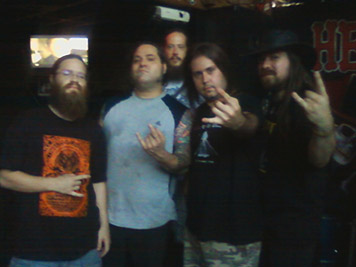
Teiwaz: No. But then, you know, pretty soon you started to recognize him. It's like, okay yeah, it's definitely Billy Milano (laughs). It's not some imposter or something.
Jötun: Oh, no. Then I recognized his inflections and his mannerisms, 'cause I'd seen interviews with him before but he was a lot heavier then, and then I was like, Oh yeah, same voice, you know, same everything.
Teiwaz: Yeah, it was him. And then we were hanging out backstage at the club a[n] hour or so later and he came walking back by again. He had a couple of P.A. speakers or something that he was wheeling down the sidewalk, and he came out into the backstage area, hung out with us for a little bit, we snapped a photo with him . . . so it was really cool.
PAO: Awesome.
Teiwaz: Yeah that was probably the most unexpected thing that came out of all of it, you know?
Jötun: Pure happenstance.
Teiwaz: Yeah, just pure happenstance that we happened to be at the same place and the same time as Billy Milano of all people.
PAO: For your 2012 summer tour you played Tennessee, New York State, Connecticut, Pennsylvania. How were you received in the Northeast?
Jötun: I would say pretty well.
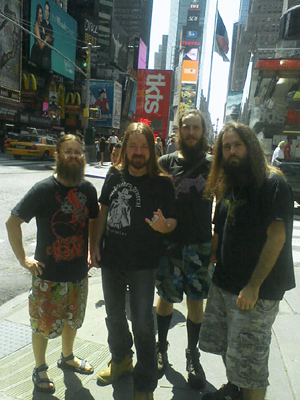

Jötun: Yeah.
Teiwaz: And kinda drove around for a while, hung out in New York City . . . Unfortunately, we didn't really have time to really see or do much of anything because we had to be at the club at like 3:00, which was when the load in time was. So we hung out in Manhattan for a while, drove over across the bridge to Brooklyn where the club was, loaded in and everything, and then we went on stage and it was like 6:00, 6:30 in the afternoon. There had to have been a good thirty people there checkin' us out.
Jötun: Something like that.
Teiwaz: Yeah I was really impressed. That was a really cool part of it. Then we did SHoD the next day, over in . . . what was the name of that town? New Britain, Connecticut?
Jötun: New London.
Teiwaz: New London, Connecticut. And that was a pretty incredible show, too.
Jötun: Yeah, the festival shows always seem to be pretty sweet.
Teiwaz: Yeah, it was a good show, good crowd. I enjoyed it a lot. Then the very last show on that tour, we played Philadelphia the next night, this little hole in the wall called JR's Bar.
Jötun: Yeah.
Teiwaz: And that was also a really good show. It was a Sunday night, and the place was packed.
Jötun: It was a really small place, so packed was like twenty people, but . . .
Teiwaz: Yeah, twenty, thirty people, but still it was an incredible show and they stuck around for the whole thing.
Jötun: That was a sweet crowd. I really liked that crowd.
Teiwaz: It was. A really receptive, responsive crowd.
Jötun: We went in there playing completely opposite what the other bands were putting on.
Teiwaz: (laughs) Yeah they had like a couple of thrash bands before us, Cookie Monster type bands, and then we get up and play. We started out with a much slower song though, because we don't really play very fast songs, so it's like we really can't compete with that.
Jötun: We slowed the whole set down.
Teiwaz: Yeah, we slowed the whole set down and started out with some really slow songs, and it really kept everybody's attention.
Jötun: Yeah we looked at that and said if we go in with our mid pace stuff, it's gonna . . .
Teiwaz: It's just not gonna work.
Jötun: There's not gonna be enough interesting there. We need to give 'em a real contrast because these folks are in here for something extreme, so let's give them our extreme, which is slow, slow, slow. And it worked. It doesn't hold every crowd. A good many crowds around DFW, you lose 'em like that. But Philadelphia, we gave 'em more extreme. We gave 'em a different extreme than they'd been listening to all night, but we used our extreme and held them.
Teiwaz: And I would have to say the very first show we did on that tour, in Chattanooga, Tennessee. That was a really good show, too. We played this place called Ziggy's. It was on a Wednesday night with this goth burlesque act called the Corpse Wax Dollies. That was probably one of the most unique shows I've ever done in my life. We got up and did a set, and then they came on and did their thing to their kinda like, what would you call it, like goth dancing routine or something.
Jötun: They call themselves the morbid cabaret, I think.
Teiwaz: Yeah. They did one set of that, and then we got up and did another set, and they came out and started doing the same thing. You know, their same routine while we were playin'.
Jötun: Yeah. That was interesting.
Teiwaz: Yeah, very (laughs). One of the most interesting shows I've ever done.
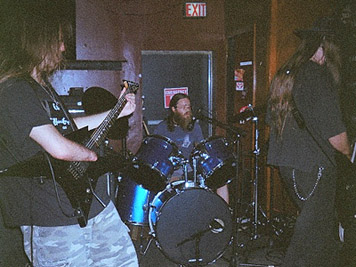
Jötun: The rest of the world, probably. We have fans in all kinds of places but I don't know if we have a big concentrated one anywhere outside of DFW. We have fans in Europe, in the South Pacific, Australia, Mexico, South America, Asia . . . I just don't know where the big honeypot is.
Teiwaz: But then again we've also got fans all over the U.S., too.
Jötun: Yeah.
Teiwaz: You know, all the bands we've played with . . . Houston, in Chicago, and everywhere else.
PAO: Where do you feel is the epicenter of American doom right now?
PAO: Where do you feel is the epicenter of American doom right now?
Jötun: I would really have to say that of late it's been Texas.
Teiwaz: Yeah, it really has, believe it or not. There's a lot of really cool doom bands that have come out of here. Solitude Aeturnus is probably the best known one.
Jötun: Yeah. Maryland has also historically been very strong. That was really kind of ground zero for American doom, and probably remains to be. The Texas scene has really quite picked up in the past five to ten years, though. It's gotten amazing. We've always had some really good doom bands from here - we've always had Solitude Aeturnus, Las Cruces, and a few others, but of late we've all of a sudden got a wealth of very good doom bands and stoner bands. It's more than I ever expected to see.
Teiwaz: It's really picked up in the last few years, just as the whole metal genre kind of had sort of a rebirth, kinda got traction again, and there's been a lot of really cool bands that have popped up in recent years.
Jötun: Yeah. Now, you know, we've got Wo Fat . . .
Teiwaz: Stone Machine Electric.
Jötun: Elliott's Keep.
Teiwaz: Of Allegiance. Project Armageddon from Houston, we've done a few shows with them.
Jötun: Las Cruces is still going strong, from San Antonio.
Teiwaz: Oh yeah.
Jötun: We've got Mala Suerte from Austin.
Teiwaz: And then that one band from Mexico we played with that time.
Jötun: Maligno.
Teiwaz: Yeah, Maligno.
PAO: Doom is often considered to be an underground genre of metal. As with any underground style of music, many hardcore fans make it their own, and become disenchanted with it or distanced from it if it starts to gain too much mainstream exposure or acceptance. What's your take on this phenomenon?
Jötun: I think it can be really natural of someone who's latched onto something that's so special and so personal to them because it's kinda like their best kept little secret, and they don't like it when something that's their baby suddenly becomes the property of the masses. I kind of understand that, but it doesn't necessarily steal from the legitimacy of the music. That's all subjective to the motivations of the individuals creating it. I do think that the abundance of bands creating doom has kind of, in a certain way, created a bit of a bog because you get that any time you get a genre that suddenly becomes overloaded with bands. Like, you still have a very few floating to the top, and what's really funny about that to me is that when you have that cream float to the top of a genre, they're usually the ones that have lasted a long time, and they're real often the originators of the genre or a few strong stalwarts that were able to come up and take hold a little later on. And I think that that's because when a sound becomes big, people do like it because it sounds cool, and you have bands that are able to write sounds and kind of emulate the overall stylings of what another band is doing, of what a more original band is doing. But the songwriting's never gonna quite pop the way the originators of the genre are able to do it, because they generally are the ones with that original spark to it. So I get it in that when a genre explodes it kind of dilutes a little bit. You are gonna have people that will latch onto a musical style because it's the popular flavor and because they can talk to their friends about it, and just because it's what's hot right now. And I can understand how people that take music very seriously get disheartened by that as well. At the same time, while music is something that people listen to partly to feel connected with other human beings, how other people perceive and appreciate a certain type of music or a particular band's music should have no bearing on any other individual's appreciation of what their ears take in. Everyone appreciates music in their own way and for what they're trying to get out of it. I hear a lot of my fellow metal musicians scream and whine from the stage about how more people should listen to metal and not Lady Gaga, but you know what, it's up to the individual what they wanna listen to. If somebody wants to go buy Lady Gaga CDs or mp3s or go spend their money on concert tickets, that's up to them. It's their money, it's their time. You know, if they're enjoying it then it doesn't hurt me.
Teiwaz: And one can still be a metalhead and like Lady Gaga, too.
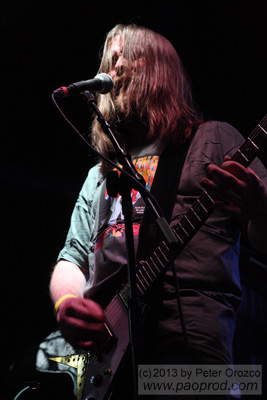
Teiwaz: I know that may be blasphemy to some, but that's how I feel about it.
Jötun: I don't know any Lady Gaga songs . . .
Teiwaz: I don't, either.
Jötun: . . . but I like some Madonna songs.
Teiwaz: Oh yeah.
Jötun: So, there you go.
Teiwaz: Yeah, so do I. Especially the early stuff.
PAO: The early stuff was the good stuff.
Jötun: And you can print that (laughs).
Teiwaz: Yeah, you can print it.
PAO: How do you feel the major record labels mold the tastes of the general public?
Jötun: (laughs)
Teiwaz: Negatively, for the most part.
PAO: Do you feel that they mold the tastes, or reflect the tastes of the music consuming public?
Teiwaz: I feel they mold the taste.
Jötun: I think it's both, honestly. I think it's both. I guess maybe an example of that would be the absolute train wreck which was that one Miley Cyrus video. The song is called "Wrecking Ball," and beyond the bubblegum production of it there's actually a well written song in there. You know, you have her singing her - forced or not - emotive vocals and everything on this love ballad, and the video is her naked, striding a wrecking ball, and in other scenes, like, licking the end of a sledgehammer with a fervishness that I am just not gonna further describe. And it's such a clash of aesthetics that are going on there that it makes you wonder who the hell thought of that and thought it would be a good idea. It was like a pop music version of that Lulu album by Metallica and Lou Reed; it's just two things that don't fit together. It was one of those things that I saw in a sports bar somewhere or something like that and went what the fuck is going on here? (laughs) You know, you have this droopy, drippy ballad and this, basically bordering on porn and not even tastefully or artfully done, shit going on visually. It just, it didn't work together. It would be like if My Dying Bride released an album and they put pictures of themselves, you know, like . . . wearing construction outfits and hard hats or something. What would it signify?
Teiwaz: Or dresses or something.
Jötun: Yeah, you know, if Exodus decided to beef out on steroids and then go take a picture of themselves looking like the cast of Jersey Shore, and put that as their album art. It wouldn't work. I think pop music started with . . . you had people that had good songwriting and good ideas going on. And I think you still have paid songwriters that are coming out with good ideas, but they get produced into bubblegum lightweightishness, and these trash aesthetics are tied to them, and it just becomes nothing because it gets lost in a formula of too many cooks spoiling the broth. In the '80s you had people like the aforementioned Madonna, you had Michael Jackson, you had Prince, uh, the list goes on . . . but in the '80s you had pop artists that actually had a vast amount of talent, that actually had something to say, actually came out with good songs. Regardless of whether you like them or not, I think it's qualifiable to say that, yeah, there was something going on there as far as songwriting. And that formula latched on so hard because it became such a huge success. You know, you had Thriller being the best-selling album of all time. And of course any industry, and the record industry is an industry, is gonna latch on to the cash cow, and it's gonna try and repeat that formula over and over and over and over again.
PAO: Where is the real innovation in music coming from today?
Teiwaz: Where is it coming from? Well forgive my biased opinion, but I'm gonna say it's coming from metal, believe it or not. I mean, there's just been so many great bands that have come out in the last, hell, in the last decade and a half, that's just some of the most incredible music I've ever heard. There's been a lot of stuff coming out of Europe . . . I mean, like, My Dying Bride, Dark Tranquility, In Flames, um . . .
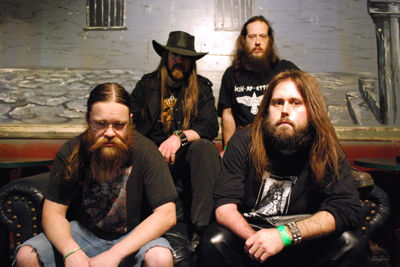
Teiwaz: Therion. Oh yeah, Therion's another good one. Night Wish . . . I mean, just . . . the list goes on.
Jötun: Finntroll.
Teiwaz: Finntroll. Like I said, the list goes on and on.
Jötun: A lot of people say that all metal sounds the same, but I don't understand that, because . . .
Teiwaz: You can say that about any genre. You can say that about jazz or anything.
Jötun: I think it's about the most fused, most expanded genre that there is out there. It's been mixed with just about every other style of music imaginable, and has held up in almost every case.
Teiwaz: And it's outlasted just about every other genre that's come and gone over the years. You know, grunge or ska/punk that happened briefly in the '90s.
Jötun: It's one that still retains its edge. If you look at larger genres, even outside of metal and hard rock, there are some genres that are just simply not what they used to be. R&B has fallen a great distance on the whole from when it was Motown, and from when you had '60s and '70s R&B and '70s funk. You just don't have R&B that sounds like that anymore. It's all completely homogenous, and just doesn't seem to have any real innovation in it to me at all. And it's unfortunate, because I think that once upon a time R&B was a brilliant shining star in popular music, and it's not the case anymore. It's still a cash cow, but it's not anything that I would spend my money on.
Teiwaz: I would have to agree, too.
PAO: Let's talk a little bit about your albums. The first full length release, Tears for Lost Ages, was released in 2009. Tell me a little about the recording of that album.
Jötun: It was done over a two month period, pretty much on a series of Mondays, over in Garland, Texas. And we went in to our friend Louie Shoop's little private studio and recording room and laid it down on a sixteen track digital machine. Started with drum tracks, got all the drum tracks done the same day, and then from there just tracked the rest of the album - guitars, bass, vocals, keys, and so forth. Once we had it done we went and did the mix on it. It was not the most satisfying sounding album at the end of the day; in retrospect, I kinda wish we had spent a little more time mixing it, but I don't think the methodology of production that went in was exactly right for us. We were using a digital machine and treating it a little too much the way you'd treat an analog machine. So I think that there were issues with the production of that particular record, but it was good enough to where it didn't really destroy anything. A lot of people said the songs didn't quite pop like they should have, but it wasn't a damning aspect. I think it was good enough to get us out there as a band with an album out and kind of put us on the map in that way. I wouldn't be keen on recording an album in the same way again.
PAO: How and when was the Doomed in Dallas EP recorded?
Jötun: That was recorded . . . spring of 2010, I wanna say? That was recorded at Skillman Street Pub, which is a now defunct venue over in north Dallas, essentially almost in Garland. We played a show there with Gates of Slumber and Weedeater and several other pretty cool bands that were touring around the country at the time. That sound guy, James McWilliams, he was really well known for being able to record you off the board and get a really good sound, and I had heard several bands play there and then right after they were done playing he would start pumping what he'd just recorded through the P.A. It always sounded really good, it sounded production quality. So that show that we played, he recorded us and we paid him twenty bucks for a CD master of it. We got it home and we listened to it, and for the most part it was good enough that we said, "You know, we need to release this. This is the kind of quality you pay for, this is the kind of quality you pay hundreds or thousands of dollars for and we just paid twenty dollars for it. I think we should use this opportunity and expand our discography a little bit." And so we put it out, and it's to date the best sounding thing that we've released. I think that that will change when we get the new album out, but it was just one of those unexpected flukes that was serendipitous. We went in and played a live show and got a record out of it.
PAO: Tell me a little about the new album. What can we expect from Doom Upon the Slain?
Jötun: Longer album. It's 55 minutes. Better production. You're gonna hear a thicker, heavier sound to it. You're gonna hear better separation. But at the same time you're gonna hear a better mix and a better meld. You're gonna hear an album that is going to represent the Kin of Ettins sound and the Kin of Ettins vision far better than the first full length did.
Teiwaz: Plus you'll hear a different lead guitarist than was on the other two records.
Jötun: You will.
Teiwaz: This new one that's coming out, Doom Upon the Slain, will be my first album with the band, the one that I played on. The other two were released before I was in the band, so this one coming out you'll hear a different lead guitarist with some different sounds and different influences and I think it should sound pretty cool.
Jötun: Yeah. You'll hear what we've come to be. You'll hear what Kin of Ettins is, because to me, in my heart, Kin of Ettins is this lineup, and this'll be the first album that represents these four guys in particular. Donar and I, we've been with the band since the first album and before, but I think that we've been able to accomplish what we've accomplished because of the four people that make up the band right now. So this will be the first hard copy release of anything that, since we got [Teiwaz] in the band, since we became the entity, us four, that is Kin of Ettins. And that I think is very important, that people hear who we are now.
PAO: Will there be an accompanying tour?
Jötun: I hope so. We were supposed to tour last year, and logistical failures just kind of caused it to bottom out. Our itinerary essentially got gutted by a couple of cancellations and it was enough to kill things.
Teiwaz: Yeah, it was enough to call it all off 'cause it just had the potential to turn into a disaster, so . . .
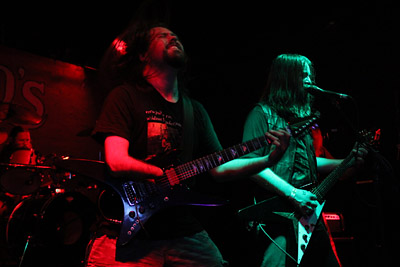
Teiwaz: Yeah, they switched hands at the last minute, and that kinda turned into a big clusterfuck.
Jötun: Well, Rob Levy attempted to cancel it.
Teiwaz: Yeah, and then another guy, Brendan something . . .
Jötun: Yeah, Eye of the Stone Goat Festival.
Teiwaz: Yeah, he stepped in at the last minute and saved the whole thing, but then our slot got pushed back. We were supposed to play at like 9:00 on Saturday night and we ended up getting pushed back to like three or four hours before that. Unfortunately, that ended up being the very last SHoD that they ever did. The one they did last year, that was it. They're no more.
Jötun: Yeah.
Teiwaz: SHoD, which stands for Stoner Hands of Doom, for those that may not know.
Jötun: We got to play the previous year, so we got to put that under our belts.
Teiwaz: Yeah.
Jötun: We were a little too dubious and had a little too much trepidation, I think, to try and go forward with two shows, and having them be five days apart, whatever we ended up with after the cancellations happened. I have courted the Doom in June guy this year. It didn't happen this year. I don't know if it'll happen next or not. Mike Smith with Days of the Doomed is takin' a break next year, so we won't be playing that festival. If we do any touring around it, it'll either be connected to one of those festivals like that and be more a long distance thing, or we'll kind of concentrate more on cities that are in adjacent states or do more Texas touring. If we can get on Doom in June next year - it's doubtful - but if we could get on that, we would do a tour around that. I'm tending to lean more into thinkin' that we'll probably hit more Texas cities. We'll try and hit Oklahoma, Arkansas, Louisiana, stuff that's weekend jaunts and places we can get to pretty easily, try and bolster our fan base in Texas and gain a little bit in other regions. We've got a little pocket of fans in Louisiana we could go play for. So we'll see. I wanna do some touring around it, but it kind of all depends upon what happens. We don't have any kind of label backing or anything like that, so we kind of have to rely on our own resources for touring, which we have historically done okay with. But it's difficult at this point to look that far into the future, because we booked a tour for last year that we had high hopes for, and it ended up not happening.
PAO: You played that benefit show for Big Mo at Reno's last year. How important is it for the people in the local music scene to band together in times of need, and do you feel there's enough of that currently going on?
Teiwaz: Well, it's very important any time somebody is in need like that.
Jötun: Yeah, and, you know, I think we do pretty well with it around here.
Teiwaz: Yeah. Most definitely.
Jötun: I think I said earlier that music is something that people listen to to feel connected with other human beings. And so I think it's just a natural progression in that music plays a role whenever people come together to share their joys or their sorrows or their laughter or their pain. Music is almost unilaterally there in some form to bring us closer together and to bind our endeavors together. Music is always there for those of us with ears to hear it.
Teiwaz: And it can really brighten up your day when you've had a crappy day, or you're just in a bad mood. Put on some fuckin' metal in the stereo, crank it up, and . . . always lifts my mood.
Jötun: Yeah. The right song will make me wanna punch a hole in the wall in the moment, but then once it's over I'll feel better.
Teiwaz: Go grab your guitar and strike out some chords, shred for a little while, same effect.
PAO: What would you say have been the most important lessons you've learned from making music over the years?
Teiwaz: Persistence is a good quality to have. You know, keep at it, keep doing what you love and good things will happen to you.
Jötun: Yeah. I don't know that I could sum it up any better. It's a lesson in perseverance, and it's a lesson in what it means to have a labor of love because you generally don't get a whole lot materially out of making music. You have to have other, more abstract reasons for wanting to do it.
Teiwaz: Number one, you do it for the love of the music. You love doing it, you love playing live in front of people, and you do it for the friends you can make along the way, the experiences you can have, the places you can go and see.
Jötun: It is like life in that it is more than the sum of its parts.
Teiwaz: But it brings a lot more to life, too. In the sense that, like I said, you get to play in front a bunch of different crowds, see all these places you've never been to before, and have the potential to do that again in the future.
Jötun: And you make a lot of friends.
Teiwaz: A lot of friends, yeah, that are also doing it for the same reasons you are.
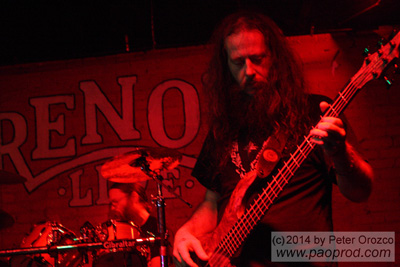
PAO: Is there anything else you want to say?
Jötun: Horns up.
Teiwaz: Horns up, rock on, and . . .
Jötun: Peace, love, and doom.
Teiwaz: Peace, love, and doom, and check out our new album once it comes out, which hopefully should be very soon here. And it's gonna be called Doom Upon the Slain.
PAO: Thanks for agreeing to this interview.
Teiwaz: Thanks for having us.
Jötun: Thank you.
Kin of Ettins rehearsal space, 5/11/2014